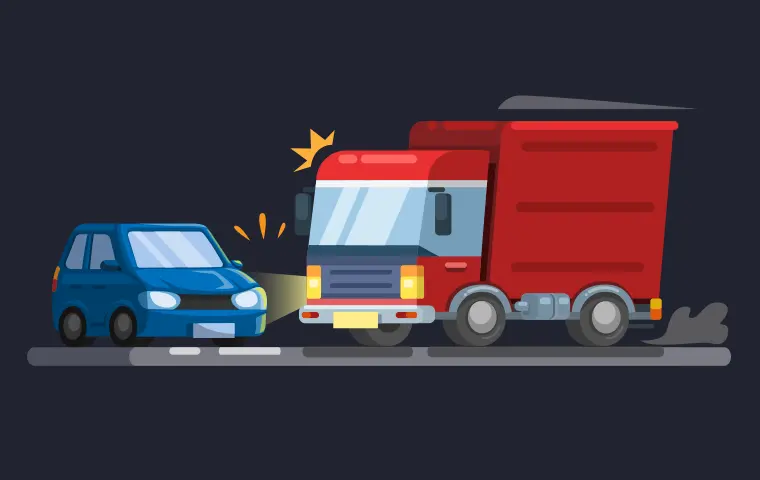In the dynamic world of fleet management, understanding the causes of accidents is more than necessary. It’s a pivotal aspect of ensuring safety and efficiency. This comprehensive guide delves into all of the factors contributing to fleet accidents. We’ll explore their complex nature and their significant impact on operations. A fleet manager who understands these causes has the insights to implement preventative strategies. The result is a net positive: a safer and more reliable fleet environment.
Understanding Fleet Accidents
A fleet accident describes any unintentional incident involving a vehicle within a company's fleet that results in property damage, injury, or both. These accidents range from simple fender benders to significant collisions. They impact not just the vehicles involved but also the overall operations of the fleet.
Recent statistics highlight the concerning prevalence of such incidents. For instance, studies show that commercial fleets are involved in accidents at a rate of around 20% annually. This alarming figure emphasizes the risks inherent in fleet operations. It also highlights the importance of understanding the causes of fleet accidents. By identifying and analyzing fleet accident causes, fleet managers can develop targeted strategies to reduce the frequency and severity of accidents.
There’s a wide range of reasons a fleet accident can occur. These are just some risk factors to consider:
- Driver Error
- Mechanical Failure
- Environmental Factors
- Infrastructural Challenges
You must understand these fleet accident causes to properly implement strategies to avoid them. Fleet managers who prioritize this understanding can significantly enhance their fleet operations' safety, efficiency, and reliability.
4 Common Fleet Accident Causes
In this section, we'll explore some of the most common accident causes in fleets. Understanding these factors is the first step in preventing accidents and maintaining a safe, efficient fleet.
No. 1: Driver Error
Driver error remains one of the top causes of fleet accidents. Such errors can result from distractions, misjudgment of traffic conditions, or failure to adhere to traffic rules. Proper training and continuous monitoring can help reduce these incidents.
No. 2: Mechanical Failure
Mechanical failures, such as brake malfunctions or tire blowouts, can lead to serious accidents. Regular maintenance and thorough vehicle inspections are crucial to identify and address problems before they lead to accidents.
No. 3: Inclement Weather
Weather conditions like rain, snow, and fog can significantly increase the risk of accidents. Drivers should know how to handle various weather conditions, and fleet vehicles should have the appropriate safety features for varying climates.
No. 4: Reckless Driving
Reckless driving by either the fleet driver or other road users can cause accidents. This includes speeding, aggressive driving, and not following road safety rules. Implementing strict policies against such behavior within the fleet can help mitigate these risks.
Addressing these auto accident reasons is critical for improving the fleet’s overall safety and performance.
Preventing Fleet Accidents
Implementing effective safety measures is crucial in preventing fleet accidents. Here's a list of strategies for enhancing safety.
No. 1: Regular Vehicle Maintenance
Consistent maintenance checks prevent mechanical failures. Azuga’s maintenance alerts can help you schedule and track maintenance activities, ensuring vehicles are always in top condition.
No. 2: Driver Training Programs
Continuous driver education on safe driving practices is vital. Azuga’s platform assists in identifying areas where drivers need training based on their driving behavior data. The data we provide helps implement this training in a meaningful way.
No. 3: Use of Telematics for Monitoring Driving Behavior
Monitoring driving patterns helps in identifying risky behaviors. Azuga’s telematics technology provides real-time data on driving habits like hard braking, speeding, or rapid acceleration, allowing you to make corrective actions in real time.
No. 4: Weather and Road Condition Alerts
Keeping drivers informed about weather and road conditions can prevent accidents. Azuga Routes can send real-time alerts to drivers about potential hazards, helping them better prepare.
No. 5: Implementing Strict Safety Policies
Establishing and enforcing safety policies is vital. You can use data obtained from Azuga’s robust telematics software to pinpoint areas for improvement. Once you’ve established safety policies, Azuga’s platform can help monitor compliance with these policies, ensuring that all drivers adhere to the set safety standards.
No. 6: Emergency Response Planning
Having a plan for emergencies ensures quick response in case of an accident. Azuga’s technology can provide critical information in real-time during an incident, aiding in prompt and efficient emergency response.
By integrating these safety measures with Azuga's advanced fleet management technology, fleet managers can significantly reduce accident risks and promote a safety culture within their fleet operations.
It’s Never Too Early to Prioritize Accident Prevention— Try Azuga Now!
Accident prevention is not just about reducing costs; it's about safeguarding lives and ensuring the smooth operation of your fleet. A focus on the well-being of drivers and the integrity of your fleet helps you maintain a successful and responsible business.
Azuga stands as a beacon in the fleet management field, trusted for our cutting-edge technology and commitment to excellence. Our solutions provide comprehensive insights into fleet operations, emphasizing safety, efficiency, and reliability. With Azuga, you are not just adopting a technology solution but embracing a partnership dedicated to your fleet's success.
Discover the difference Azuga can make for your fleet. Try a demo of our software today and experience firsthand the impact of our innovative solutions on your fleet management practices.








